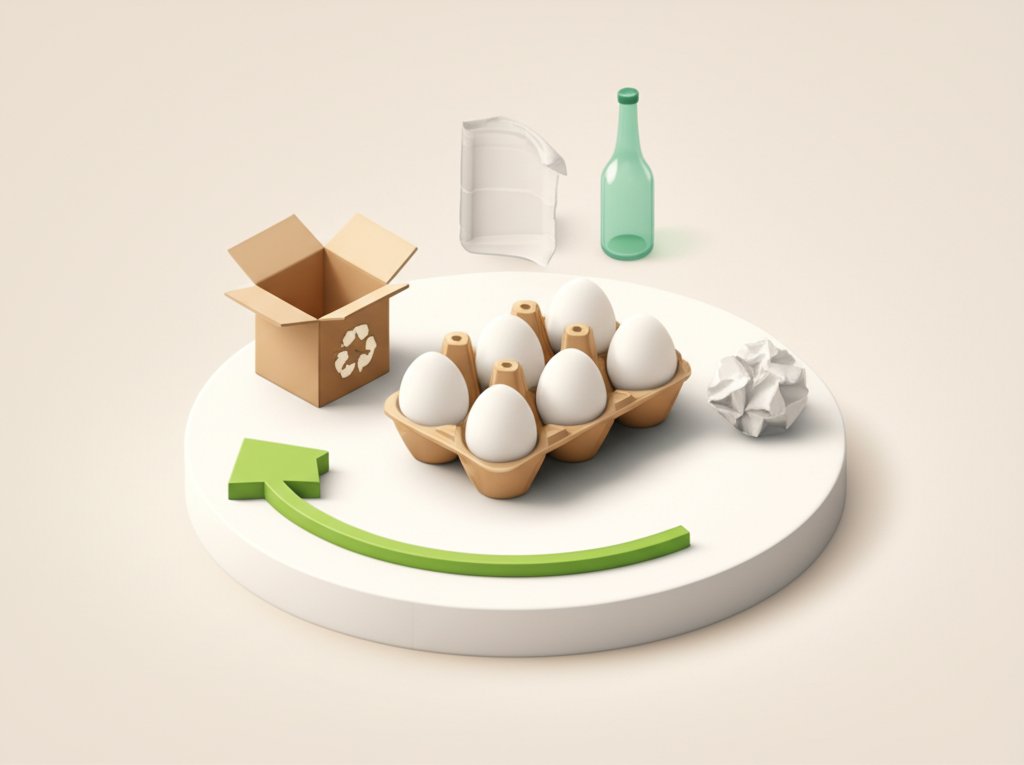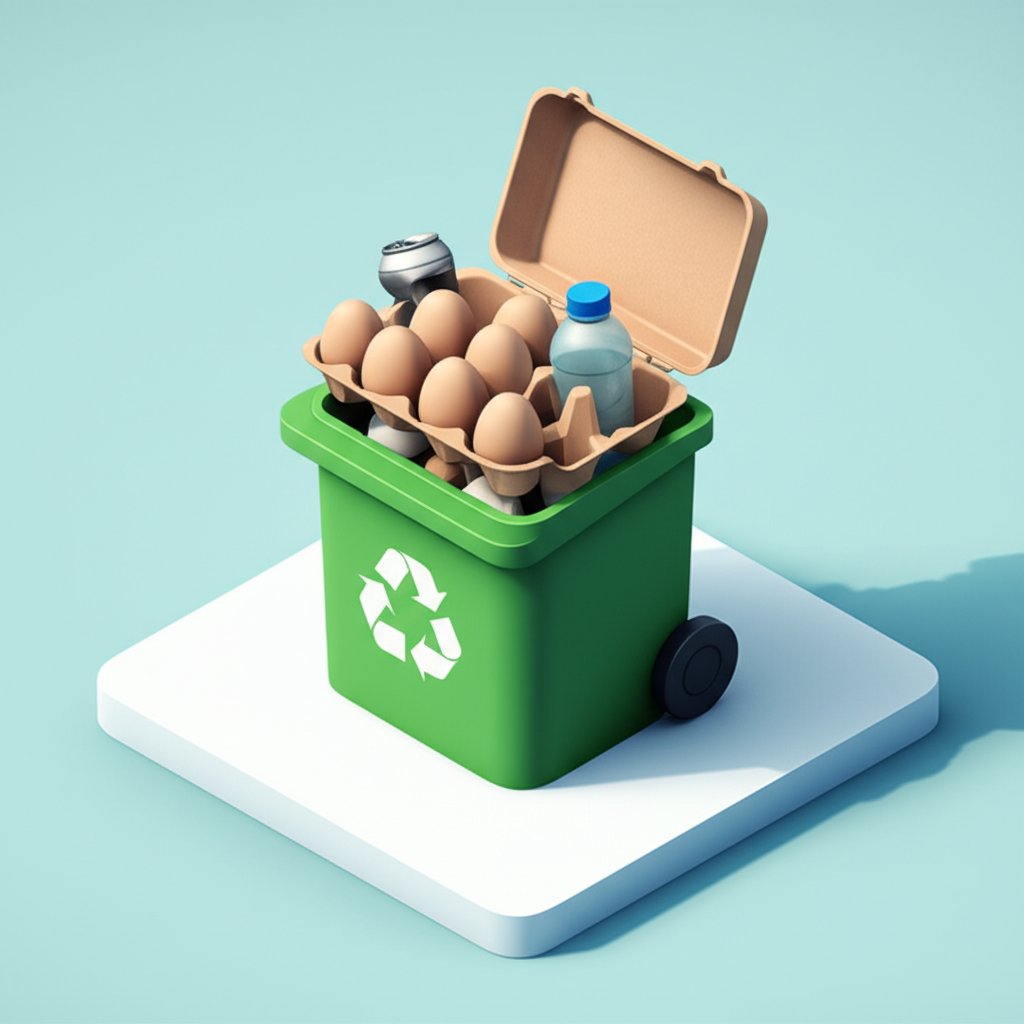Ever found yourself paused at the recycling bin, egg carton in hand, wondering if it belongs there? You’re not alone. The question, “Are egg cartons recyclable?” is far more complex than a simple yes or no. From molded pulp to clear plastic and even the notoriously tricky Styrofoam, recycling egg cartons hinges on a cocktail of factors: the carton’s material, its cleanliness, and, crucially, your local egg carton recycling guidelines.
This ultimate guide will unravel the mysteries of recycling egg cartons, equipping you with the knowledge to make informed, environmentally friendly decisions every time. We’ll dive deep into different materials, demystify local regulations, and explore countless creative egg carton repurposing ideas, ensuring your empty cartons contribute to a greener planet, not a landfill.
Decoding the Material Matrix: Are Your Egg Cartons Recyclable?

The journey of an egg carton after it’s empty largely depends on what it’s made from. Understanding the different types is the first step in successful egg carton recycling.
Molded Pulp/Paperboard Cartons: The Greenest Option?
These are the most common and often the most environmentally friendly egg cartons. Made from recycled paper fibers (like newspapers or cardboard), they have a distinctly fibrous, matte texture.
- Recyclability: Generally, yes! Many municipal recycling programs accept clean molded pulp cartons, classifying them similar to cardboard. They are typically made from short-fiber paper, meaning they can only be recycled a few times before the fibers become too short.
- Compostability: Absolutely! If your local program doesn’t accept them, or if you prefer, molded pulp cartons are excellent for composting. They break down easily, adding valuable carbon to your compost pile.
- Contamination Catch: Even these eco-champions have a catch. Any significant egg residue (yolk, albumen, or shell fragments) can contaminate the paper recycling stream, rendering the entire carton unrecyclable. Thorough cleaning is key.
- Waxed Cartons: A rare but important distinction: some molded pulp cartons might have a thin wax coating for added moisture resistance. These are typically not recyclable with standard paper recycling and should be treated as general waste or composted if the wax is minimal and plant-based.
Clear Plastic (PET/RPET) Cartons: A Mixed Bag
Often labeled with a #1 or PET symbol, these transparent plastic cartons offer a clear view of your eggs. They are typically made from recycled PET plastic (RPET).
- Recyclability: This is where the local rules become paramount. While PET plastic itself is highly recyclable, the specific design, size, and quantity of plastic egg cartons in the waste stream can sometimes pose challenges for Material Recovery Facilities (MRFs). Some programs accept them, others do not.
- Preparation: If accepted, ensure they are clean and dry, free of any food residue. You usually don’t need to flatten them.
- Compostability: No. Plastic cartons are not compostable and will persist in the environment for hundreds of years if not properly recycled.
Styrofoam (Polystyrene – PS #6) Cartons: The Recycling Headache
Lightweight, protective, and often brittle, Styrofoam (polystyrene) egg cartons are universally considered the least desirable option from a recycling perspective.
- Recyclability: In most residential curbside programs, Styrofoam egg cartons are NOT recyclable. Polystyrene foam is difficult and uneconomical to recycle due due to its low density (mostly air), making collection and transportation inefficient. It also requires specialized processing equipment that most MRFs don’t possess.
- Environmental Impact: When sent to landfills, Styrofoam takes an extremely long time to degrade, breaking into smaller microplastic pieces that can harm wildlife and ecosystems.
- Special Programs: Very few specialized drop-off centers or mail-back programs might accept clean Styrofoam, but these are rare. Always verify locally.
Emerging and Eco-Friendly Alternatives
The packaging industry is constantly innovating. Keep an eye out for newer, more sustainable egg carton materials, such as:
- Bagasse Cartons: Made from sugarcane fiber, a byproduct of sugar production. These are often compostable and sometimes recyclable.
- Biodegradable/Compostable Plastics: While less common for egg cartons, advancements in plant-based plastics (PLA, PHA) are making these options more viable. Check for specific certifications.
The Local Loop: Why Recycling Rules Vary So Much
Understanding the materials is just half the battle. The golden rule for recycling egg cartons is always: “Check with your local waste management provider.” This isn’t just a suggestion; it’s a necessity because what’s accepted in one town might be rejected in another.
Material Recovery Facilities (MRFs) and Their Limitations
The primary reason for varying rules lies with Material Recovery Facilities (MRFs) – the places where your recyclables are sorted and processed.
- Technology and Equipment: MRFs have different capabilities. Older facilities might lack the advanced sorting technology to separate certain plastics or deal with smaller items like egg carton pieces.
- Market Demand: Recycled materials are commodities. If there isn’t a buyer for a particular type of plastic or low-grade paper pulp, the MRF won’t collect it, as it would just become costly waste for them.
- Contamination Rates: High contamination rates (e.g., egg residue on paper cartons) can force MRFs to reject an entire category of material, even if it’s technically recyclable.
Contamination: The Recycling Killer
For both paper-based and plastic egg cartons recyclable in your area, contamination is the biggest threat to successful egg carton recycling.
Just like proper storage of your recyclables at home is crucial, so too is ensuring your egg cartons are handled correctly to avoid contamination, as outlined in resources about how recyclables should be stored.
- Food Residue: Even a tiny bit of dried egg yolk can spoil a batch of otherwise good paper recycling. The organic matter can attract pests, create mold, and make it impossible to reprocess the fibers into new products.
- Mixed Materials: Cartons with multiple materials (e.g., a plastic window on a paper carton) might be rejected if the MRF cannot easily separate them.
Checking Your Local Guidelines: The Golden Rule
There’s no global answer for “Can you recycle egg cartons?” To avoid “wishcycling” (throwing something into the recycling bin hoping it’s recyclable), always:
- Visit Your Municipality’s Website: Most local waste services have a comprehensive list or search tool.
- Download a Recycling App: Many cities offer apps that let you search specific items.
- Call Them Directly: When in doubt, call your local waste management department.
Global Perspectives: A Glimpse at UK, EU, and US Practices
- United States: Highly fragmented. Rules vary significantly county by county, sometimes even city by city. Paper/pulp are most often accepted if clean, while plastic and Styrofoam are much less so.
- United Kingdom: Similar to the US, specific council guidelines are crucial. Many councils accept paper/pulp cartons if clean, but plastic and Styrofoam are rarely collected curbside.
- European Union: Due to stronger directives, recycling rates are generally higher. However, even here, the specifics for egg carton recycling can differ. Paper/pulp cartons are widely accepted, but plastic carton acceptance still depends on local infrastructure and market demand.
Beyond the Bin: Creative Egg Carton Repurposing Ideas
If recycling egg cartons isn’t an option, or if you simply want to extend their lifespan, egg carton repurposing is a fantastic eco-conscious alternative. Their unique shape and sturdy structure make them surprisingly versatile.
Garden & Seed Starting Wonders
Egg cartons are a gardener’s best friend, especially the pulp/paperboard variety.
- Seed Starters: The classic use! Fill compartments with soil, plant seeds, and once seedlings are ready, you can often plant the entire biodegradable cup directly into the garden, minimizing transplant shock.
- Mini Greenhouses: Cover your seed-filled cartons with plastic wrap to create a humid microclimate for germination.
- Slug Protection: Place individual carton cups around young seedlings as a temporary barrier against slugs and snails.
- Compost Boosters: Tear up clean, un-waxed pulp cartons and add them to your compost pile. They provide excellent “brown” material (carbon) to balance “greens” (nitrogen).
Crafty Creations for Kids and Adults
Unleash your inner artist with these fun egg carton repurposing projects.
- Paint Palettes: The individual cups are perfect for holding small amounts of paint for art projects.
- Holiday Decorations: Transform cartons into wreaths, ornaments, or festive garlands.
- Animal Figures: Cut and paint individual cups to create caterpillars, ladybugs, chickens, or other creatures.
- Flower Bouquets: Cut out individual cups, shape them into petals, paint, and glue onto pipe cleaners for everlasting flowers.
- Jewelry Holders: Line the bottom of each cup with fabric to create safe nests for earrings or rings.
Ingenious Home Organization Hacks
The cellular structure of egg cartons is perfect for tidying small items.
- Small Item Organizer: Use them for beads, buttons, thumbtacks, screws, hair ties, or craft supplies.
- Desk Drawer Dividers: Trim to fit drawers and organize paperclips, erasers, or charging cables.
- Toolbox Organizer: Keep small nuts, bolts, and washers separated and easy to find.
- Christmas Ornament Storage: Individual compartments are perfect for protecting delicate ornaments.
Unexpected Uses: From Fire Starters to Soundproofing
Think outside the box with these creative and practical uses.
- Fire Starters: Fill pulp carton cups with dryer lint and melted candle wax for effective, homemade fire starters for camping or fireplaces. (Ensure they are completely clean).
- Packing Material: Tear up pulp cartons to cushion delicate items when shipping or moving.
- Ice Cube Trays (for non-food items): Use them to freeze small portions of paint, or other craft liquids for later use.
- Soundproofing Panels (DIY): While not professional-grade, overlapping flattened pulp cartons can offer minor acoustic dampening in a craft room or garage.
Preparing Your Cartons for Their Next Life
Whether you’re aiming for egg carton recycling, composting, or egg carton repurposing, proper preparation is essential.
Cleaning for Recycling Success
- Rinse Thoroughly: For both plastic and pulp cartons, rinse away all traces of egg residue. Use cold water to prevent cooking the egg onto the surface.
- Air Dry: Allow cartons to completely air dry before placing them in your recycling bin. Moisture can cause paper to mold and plastic to be less desirable for reprocessing.
- Remove Labels (Optional but Recommended): While not always mandatory, removing non-paper labels from plastic cartons can help in the recycling process.
Breaking Down for Composting
- Remove Labels and Staples: Ensure no plastic labels or metal staples are present.
- Tear into Smaller Pieces: Break down pulp cartons into smaller, manageable pieces to accelerate decomposition in your compost pile.
- Mix with Greens: Balance the carbon-rich paper with nitrogen-rich “green” materials like food scraps or grass clippings.
Prepping for Repurposing Projects
- Clean and Dry: Always start with clean, dry cartons, especially if they’ll be handled by children or used for storage.
- Inspect for Damage: Ensure cartons are structurally sound for their intended repurpose.
- Sanitize (Optional): For projects requiring extra cleanliness, a quick wipe with a diluted disinfectant can be beneficial.
The Future of Egg Packaging: Innovations for a Greener Tomorrow
The global demand for eggs is immense, and with it, the challenge of sustainable packaging. The good news is that innovation is constantly addressing the complexities of egg cartons recyclable materials and methods.
Biodegradable and Compostable Solutions
Manufacturers are increasingly investing in truly biodegradable and home-compostable materials beyond traditional pulp. This includes:
- Mushroom-based packaging: Grown from agricultural waste and mycelium (mushroom roots), offering a strong, lightweight, and fully compostable alternative.
- Seaweed and Algae-based packaging: Emerging technologies are exploring the use of these rapidly renewable resources for packaging that dissolves or fully composts.
- Advanced Pulp Formulations: Research is improving the durability and moisture resistance of pulp cartons, reducing the need for non-recyclable coatings.
Producer Responsibility and Consumer Education
A significant shift is also coming from producers, with a greater emphasis on Extended Producer Responsibility (EPR) programs. These initiatives hold manufacturers accountable for the entire lifecycle of their products, including packaging. This can lead to:
- Standardized Labeling: Clearer, more consistent labeling on cartons indicating their recyclability (or compostability) in common systems.
- Investment in Recycling Infrastructure: Producers may contribute to funding better recycling facilities and collection programs.
- Design for Recyclability: Packaging designed from the outset to be easily recycled or composted.
Ultimately, tackling the question of egg cartons recyclable requires a multi-pronged approach: informed consumers, innovative producers, and robust recycling infrastructure.
Conclusion: Cracking the Code for a Sustainable Future

The journey of an empty egg carton is a microcosm of our broader recycling challenges. While the question “Are egg cartons recyclable?” doesn’t have a single universal answer, understanding the material, checking local guidelines, and embracing alternatives like egg carton repurposing empowers you to make a significant positive impact.
Never assume. Always verify. By taking a moment to understand your local egg carton recycling rules and exploring the vast world of egg carton repurposing and composting, you are actively contributing to a more sustainable future. Every informed decision, every reused carton, helps keep valuable resources out of landfills and reduces our environmental footprint.
FAQ: Your Top Questions About Egg Carton Recycling Answered
Q1: Are all paper egg cartons recyclable?
Not always. While most molded pulp or paperboard egg cartons recyclable in many areas, their recyclability depends on two main factors: cleanliness (no egg residue) and whether they have any wax coatings that prevent fiber breakdown. Always check your local recycling program’s guidelines.
Q2: Can plastic egg cartons be recycled?
Some can, but it’s highly dependent on your local recycling facility. Most clear plastic egg cartons are made from PET (#1 plastic), which is widely recycled. However, due to their shape or size, some Material Recovery Facilities (MRFs) may not accept them. Verify with your local waste management services for specific rules regarding recycling egg cartons made of plastic.
Q3: Why aren’t Styrofoam egg cartons recyclable?
Styrofoam (polystyrene #6) egg cartons are rarely accepted in curbside egg carton recycling programs. This is primarily because they are mostly air, making them bulky and uneconomical to transport, and require specialized processing equipment that most standard MRFs don’t have. They are also brittle and can easily break into small pieces, contaminating other recycling streams.
Q4: What’s the best way to prepare an egg carton for recycling or repurposing?
For both egg carton recycling and egg carton repurposing, the most crucial step is to ensure the carton is clean and dry. Rinse off any egg residue with cold water and allow it to air dry completely to prevent mold and contamination.
Q5: If I can’t recycle my egg carton, what are my other options?
If egg carton recycling isn’t available, consider these alternatives:
Q6: Can I compost plastic egg cartons?
No, plastic egg cartons, even if made from recycled materials, are not compostable. They will not naturally break down in a compost pile and should only be recycled if your local program specifically accepts them.
Q7: Are egg cartons with “eco-friendly” labels always recyclable?
Labels like “eco-friendly” or “biodegradable” can sometimes be misleading. Always look for specific recycling symbols (like the Mobius loop with a number) or composting certifications. The ultimate authority on whether a carton is accepted for egg carton recycling in your area remains your local waste management guidelines.









